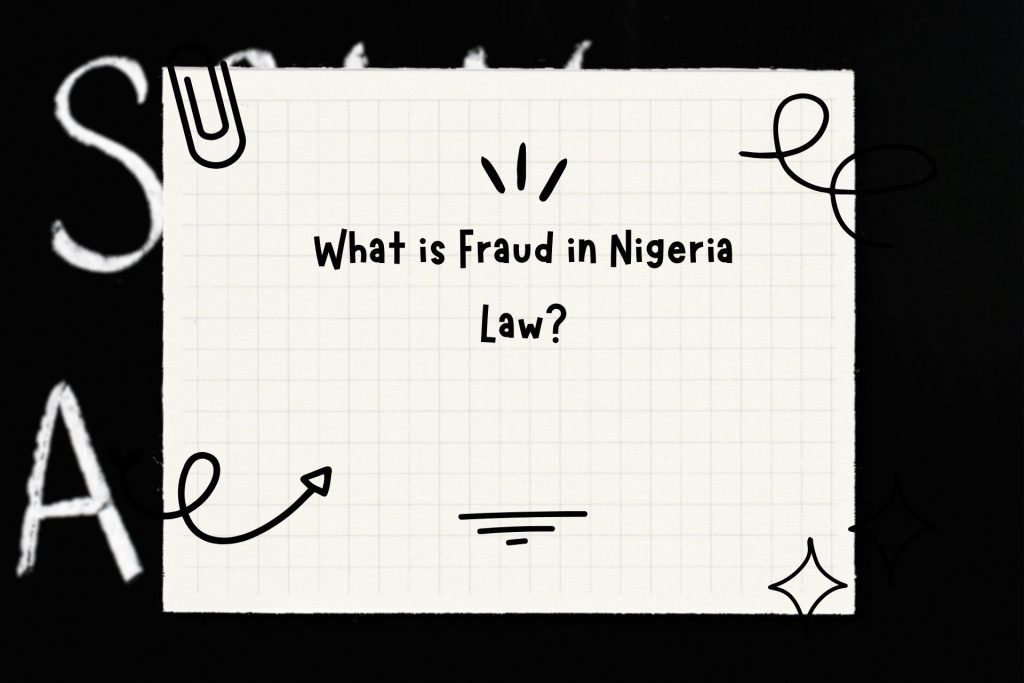Fraud remains a persistent challenge in Nigeria, constituting a wide-ranging term that encompasses any deceitful or misrepresented act aimed at unfairly benefiting oneself or causing harm to others.
In Nigeria, fraud is a grave offense that can lead to severe legal repercussions, including imprisonment and financial penalties.
Under Nigerian law, fraud manifests in various forms, encompassing financial fraud, identity theft, forgery, and bribery. Financial fraud stands as the most prevalent form in Nigeria, involving the use of false information or deceptive tactics to obtain money or property from individuals or organizations.
Conversely, identity theft entails the pilfering of personal information, such as name, date of birth, and social security number, to perpetrate fraud.
Forgery also prevails as a common form of fraud in Nigeria, encompassing the creation or alteration of documents with the intent to deceive, such as forging a signature on a check or tampering with a contract.
Lastly, bribery, involving the exchange of something of value for a favor or advantage, remains a serious offense in Nigeria, carrying the potential for severe legal ramifications, including imprisonment and fines.
Definition of Fraud in Nigerian Law

Fraud is a criminal offense that involves deception and dishonesty for personal gain. In Nigerian law, fraud is defined as any act that is done with the intent to deceive, conceal or misrepresent the truth. It is also an act that is done with the intent to gain an advantage, cause a loss or expose another person to a risk of loss.
Fraud can take many forms in Nigeria, including but not limited to, forgery, embezzlement, bribery, false pretenses, and cybercrime. The most common types of fraud in Nigeria are advance fee fraud (popularly known as ‘419’), bank fraud, insurance fraud, and tax fraud.
The penalties for fraud in Nigeria vary depending on the severity of the offense and the amount of money involved. The Criminal Code Act and the Economic and Financial Crimes Commission (EFCC) Act provide for imprisonment, fines, and restitution for victims of fraud.
It is important to note that in Nigeria, ignorance is not a defense for fraud. Anyone who engages in fraudulent activities, whether knowingly or unknowingly, can be held liable under the law. Therefore, it is essential for individuals and businesses to be aware of the various forms of fraud and take steps to prevent and report any suspicious activities.
Legal Framework Governing Fraud
In Nigeria, there are several laws and regulations that govern fraud. These laws are put in place to ensure that individuals and organizations do not engage in fraudulent activities that could harm the economy and society at large. The following are some of the laws that govern fraud in Nigeria:
Economic and Financial Crimes Commission Act
The Economic and Financial Crimes Commission (EFCC) Act was established in 2004 to investigate, prosecute and prevent economic and financial crimes in Nigeria. The Act gives the EFCC the power to investigate and prosecute cases of fraud, money laundering, and other financial crimes. The EFCC Act also provides for the establishment of the Special Control Unit against Money Laundering (SCUML), which is responsible for monitoring and regulating the activities of Designated Non-Financial Institutions (DNFIs) in Nigeria.
Advance Fee Fraud and Other Fraud Related Offences Act
The Advance Fee Fraud and Other Fraud Related Offences Act was enacted in 1995 to combat the growing problem of advance fee fraud (popularly known as “419” fraud) in Nigeria. The Act criminalizes various forms of fraud, including advance fee fraud, credit card fraud, and identity theft. It also provides for stiff penalties for offenders, including imprisonment and fines.
Criminal Code Act
The Criminal Code Act is a federal law that applies to all states in Nigeria. The Act criminalizes various forms of fraud, including forgery, counterfeiting, and obtaining property by false pretense. It also provides for the punishment of offenders, including imprisonment and fines.
Cybercrimes (Prohibition, Prevention, Etc) Act
The Cybercrimes (Prohibition, Prevention, Etc) Act was enacted in 2015 to combat the growing problem of cybercrime in Nigeria. The Act criminalizes various forms of cybercrime, including hacking, identity theft, and cyberstalking. It also provides for the punishment of offenders, including imprisonment and fines.
In conclusion, these laws and regulations provide a legal framework for combating fraud in Nigeria. The government and law enforcement agencies are working tirelessly to ensure that these laws are enforced and that individuals and organizations found guilty of fraud are brought to justice.
Types of Fraud Recognized in Nigeria
Fraud is a serious criminal offense in Nigeria, and there are several types of fraud recognized under Nigerian law. This section will discuss the most common types of fraud in Nigeria.
1. Financial Institution Fraud
This type of fraud involves the use of deception to obtain money or assets from financial institutions. This may include bank fraud, insurance fraud, and securities fraud. Financial institution fraud is a serious offense in Nigeria, and those found guilty can face significant fines and imprisonment.
2. Identity Theft and Cyber Fraud
Identity theft and cyber fraud involve the use of technology to steal personal information or money from individuals. This type of fraud is becoming increasingly common in Nigeria, as more people use the internet and digital devices. Cyber fraud can take many forms, including phishing scams, malware attacks, and social engineering.
3. Advance Fee Fraud (419 Fraud)
Advance fee fraud, also known as 419 fraud, is a type of scam that involves promising a large sum of money in exchange for a small upfront payment. This type of fraud is named after the section of the Nigerian Criminal Code that deals with it. 419 fraud is one of the most common types of fraud in Nigeria and has been responsible for significant financial losses for victims.
Prosecution of Fraud Cases
Burden of Proof
In Nigeria, the burden of proof lies with the prosecution in fraud cases. The prosecution must prove beyond reasonable doubt that the accused committed the fraudulent act. The prosecution must also prove that the accused intended to deceive or defraud the victim.
Investigation Process
The investigation of fraud cases in Nigeria is usually carried out by the Economic and Financial Crimes Commission (EFCC) or the Independent Corrupt Practices and Other Related Offences Commission (ICPC). The investigation process involves gathering evidence, interviewing witnesses, and analyzing financial records.
Trial and Sentencing
If the accused is found guilty of fraud, he or she may face a prison sentence and/or a fine. The length of the sentence and the amount of the fine will depend on the severity of the fraud and the amount of money involved. The court may also order the accused to pay restitution to the victim.
Overall, the prosecution of fraud cases in Nigeria is taken seriously, and those found guilty can expect to face significant consequences.
Preventive Measures and Legal Remedies
Public Awareness and Education
One of the most effective ways of preventing fraud in Nigeria is through public awareness and education. The government, non-governmental organizations, and other relevant bodies should educate the public on the various forms of fraud, how to identify them, and how to report suspected cases. This can be done through media campaigns, workshops, and seminars.
Furthermore, the public should be encouraged to be vigilant and to verify the authenticity of any information or offer before taking any action. They should also be advised to avoid sharing personal information with strangers or unverified sources.
Legal Recourse for Victims
Individuals who have fallen victim to fraud in Nigeria possess legal recourse at their disposal. They can pursue restitution through either civil or criminal channels.
In civil proceedings, victims retain the right to file a lawsuit against the fraudster to seek compensation for the damages incurred as a consequence of the fraud. Conversely, criminal proceedings entail the prosecution and potential punishment of the fraudster in accordance with the stipulations of the law.
Nevertheless, it’s crucial to acknowledge that the legal process can be protracted and financially burdensome. Therefore, victims should enlist the assistance of proficient legal professionals to navigate them through the intricacies of the process. Moreover, they ought to ensure that they have substantial evidence to substantiate their claims.
In summation, proactive measures such as public awareness initiatives and education, in conjunction with legal remedies, can play a pivotal role in diminishing the prevalence of fraud in Nigeria.





